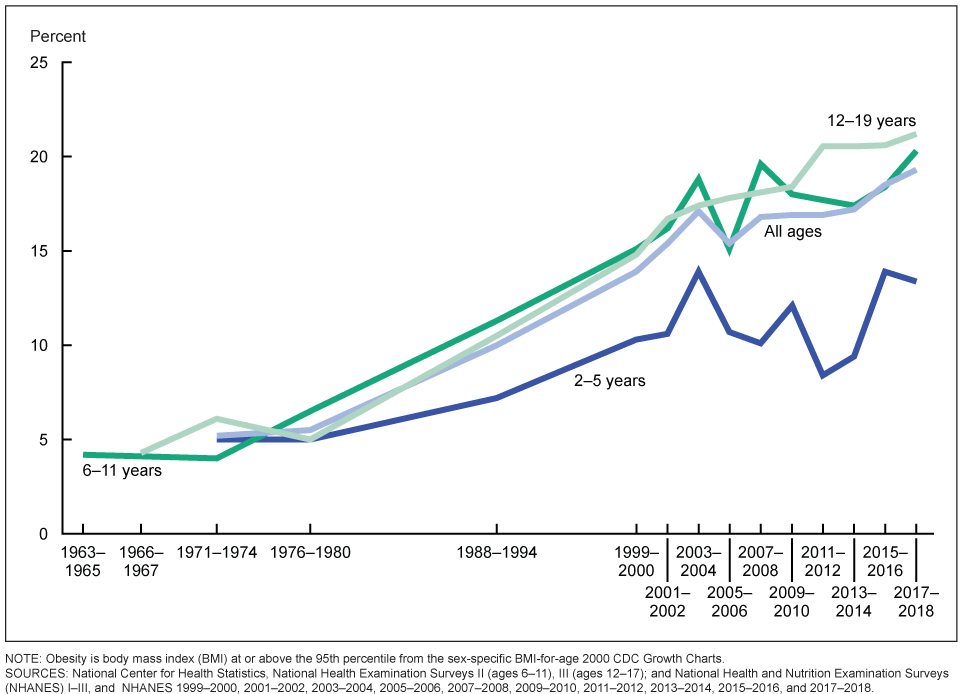As our society continues to advance, we are becoming more dependent on technology. At this point, technology has expanded into almost every aspect of our lives and is hard to avoid, even for the youth. In 2020, the American Academy for Child and Adolescent Psychiatry reported that “… children ages 8-12 in the United States spend 4-6 hours…watching or using screens…” every day, which is a drastic increase from previous years. Additionally, in 2021, the CDC stated that one in every five children in America is obese. The upward trend in screen time matches the increase in childhood obesity cases, which has become a national healthcare epidemic.
Multiple factors have led to the emergence of this epidemic, one of the most significant contributors being the COVID-19 pandemic. According to WebMD in 2022, “the average amount of time children spent staring at screens during the COVID-19 pandemic rose 52%” which makes perfect sense. The lockdown shut down almost every part of our lives and caused kids to depend on technology more than ever before. Whether it be for school or to communicate with friends, kids began to spend more time online than outside. Numerous studies have proved that increased screen time can lead to obesity, especially in children. An article on Medline stated that many food commercials are targeting the youth and can lead to unhealthy food choices as these ads typically promote processed foods or fast foods. Additionally, while watching screens, kids tend to snack, especially after viewing food-related commercials. With all this in mind, it is safe to say that the pandemic most definitely played a part in the rise of this epidemic.
Another significant factor that can affect this is not getting enough sleep. As absurd as it might sound, several studies have found a strong correlation between sleep and being overweight or obese. In 2020, a post by the Sleep Foundation stated that kids who aren’t sleeping enough can undergo the same hormonal changes as adults, which in turn can lead to weight gain. This post also explained that children with later bedtimes also tended to have worse diet quality compared to their peers with earlier bedtimes. Now, while the Kids Health Organization recommends school-aged children to get a minimum of 9 hours of sleep every night, Healthline has reported that 52% of kids in America, ages 6 to 17, don’t meet this. This certainly shows that sleep, or lack thereof, most definitely affects child obesity.
Unfortunately, child obesity can lead to several health complications in adulthood if left unaddressed. According to the CDC in 2022, child obesity can lead to a variety of different conditions and diseases. This includes a higher risk of developing heart disease, type 2 diabetes, and sleep apnea. However, these aren’t limited to physical effects. The CDC has also stated that child obesity can lead to mental repercussions such as lower self-esteem, anxiety, or depression.
Now, it is clear that childhood obesity has become a massive issue in the United States. As you now know, multiple causes can lead to child obesity, such as increased screen time or lack of sleep, however, they all lead to similar results. If not addressed during childhood, this can lead to many further health-related complications that can be fatal.
Works Cited
American Academy of Child and Adolescent Psychiatry. “Screen Time and Children.” Aacap.org, American Academy of Child and Adolescent Psychiatry, Feb. 2020, www.aacap.org/AACAP/Families_and_Youth/Facts_for_Families/FFF-Guide/Children-And-Watching-TV-054.aspx.
CDC. “Causes and Consequences of Childhood Obesity.” Centers for Disease Control and Prevention, 23 May 2022, www.cdc.gov/obesity/basics/consequences.html#:~:text=Obesity%20in%20children%20and%20adults.
“Childhood Overweight & Obesity | Overweight & Obesity | CDC.” Www.cdc.gov, 17 Sept. 2021, www.cdc.gov/obesity/childhood/index.html#:~:text=Childhood%20obesity%20is%20a%20serious.
“Youth Physical Activity Guidelines | Physical Activity | Healthy Schools | CDC.” Www.cdc.gov, 6 Sept. 2019, www.cdc.gov/healthyschools/physicalactivity/guidelines.htm#:~:text=Children%20and%20adolescents%20ages%206%20through%2017%20years%20should%20do.
Curley, Christopher. “Children Don’t Get Enough Sleep: Serious Health Problems.” Healthline, 24 Oct. 2019, www.healthline.com/health-news/children-lack-of-sleep-health-problems#:~:text=Our%20children%20aren.
Ellis, Ralph. “Kids’ Screen Time Rose 52% during the Pandemic, Study Says.” WebMD, 14 Nov. 2022, www.webmd.com/parenting/news/20221114/kids-screen-time-rose-sharply-during-pandemic-study-says.
Fry, Alexa, and Dr. Anis Rehman. “The Link between Obesity and Sleep Deprivation.” Sleep Foundation, 4 Dec. 2020, www.sleepfoundation.org/physical-health/obesity-and-sleep#:~:text=Sleep%20loss%20in%20children%20increases.
Gavin, Mary L. “Kids and Sleep (for Parents) – Nemours KidsHealth.” Kidshealth.org, kidshealth.org/en/parents/sleep.html#:~:text=toddlers%20(1%E2%80%932%20years)%3A.
“Screen Time and Children: MedlinePlus Medical Encyclopedia.” Medlineplus.gov, medlineplus.gov/ency/patientinstructions/000355.htm#:~:text=Screen%20time%20increases%20your%20child.
